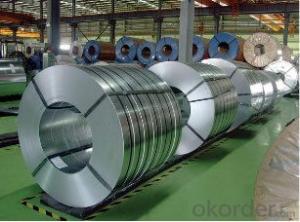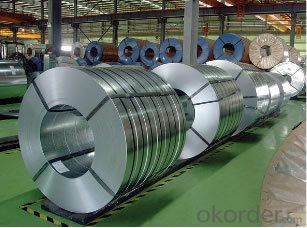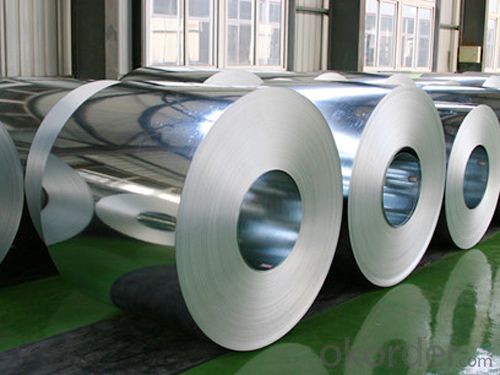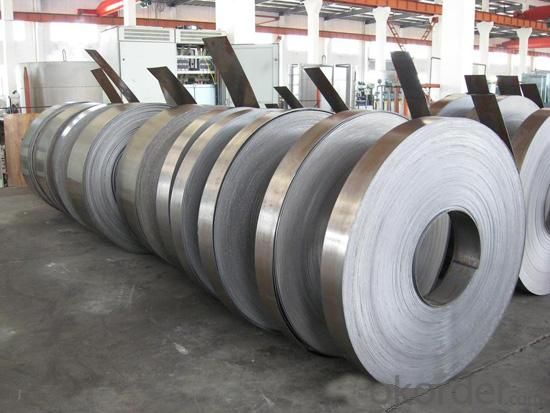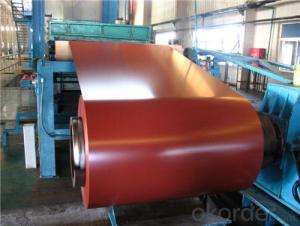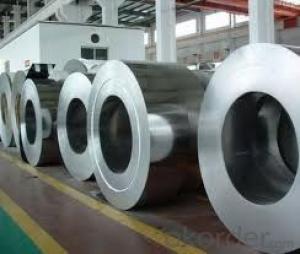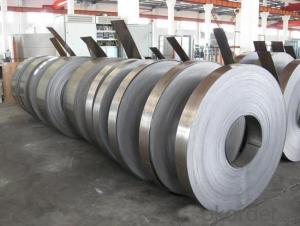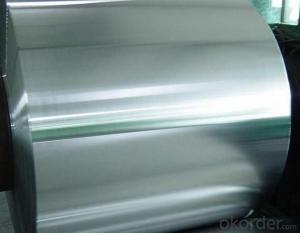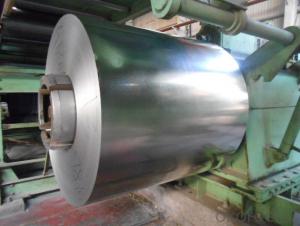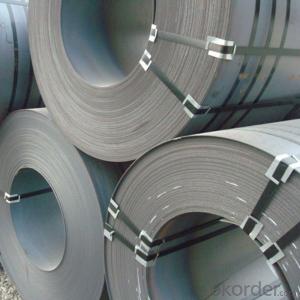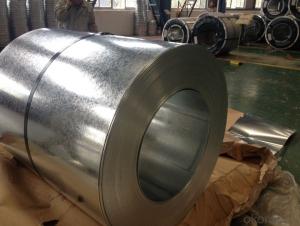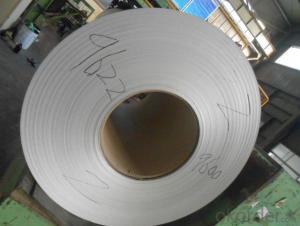Hot-Dip Galvanized Strips and Coils from China
- Loading Port:
- Tianjin
- Payment Terms:
- TT OR LC
- Min Order Qty:
- 25 m.t.
- Supply Capability:
- 20000 m.t./month
OKorder Service Pledge
OKorder Financial Service
You Might Also Like
1.Structure of Hot-Dip Galvanized Steel Strips Description:
Hot-dip galvanized steel coils are available with a pure zinc coating through the hot-dip galvanizing process. It offers the economy, strength and formability of steel combined with the corrosion resistance of zinc. The hot-dip process is the process by which steel gets coated in layers of zinc to protect against rust. It is especially useful for countless outdoor and industrial applications. Production of cold formed corrugated sheets and profiles for roofing, cladding, decking, tiles, sandwich walls, rainwater protective systems, air conditioning duct as well as electrical appliances and engineering.
2. Main Features of the Hot-Dip Galvanized Steel Strips:
• Excellent process capability
• Smooth and flat surface
• Workability, durability
• Excellent anticorrosive property
• High strength
• Good formability
• Good visual effect
3. Hot-Dip Galvanized Steel Strips Images
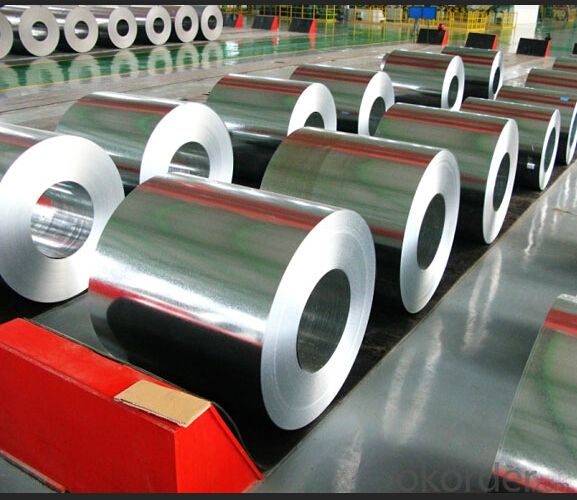
4. Hot-Dip Galvanized Steel Strips Specification
1) Capacity: about 15,000 tons per month for sheet product.
2) Standard: JIS G3302 1998, ASTM A653M/A924M 2004, all according to the customer's request
3) Thickness: 0.13mm-0.5mm
4) Width: 400mm-1000mm
5) Length: We can adjust the length according to your request
6) Zinc Coating Weight: 60g/m2-275g/m2
7) Raw Materials: Galvanized steel sheet and Pre-painted galvanized steel sheet
8) Spangle: Regular spangle, minimized spangle and zero spangle
9) Hardness: Full hard, normal
5.FAQ of Hot-Dip Galvanized Steel Strips
We have organized several common questions for our clients,may help you sincerely:
1. How to guarantee the quality of the products?
We have established the international advanced quality management system,every link from raw material to final product we have strict quality test;We resolutely put an end to unqualified products flowing into the market. At the same time, we will provide necessary follow-up service assurance.
2. How long can we receive the product after purchase?
Production period is 30 days. And we’d prefer you can give us more time to book vessel.
3. What’s the usage of cold rolled steel coil?
Auto manufacture, Oil drum, Transformer's tank panel, Furniture etc.
- Q: How are steel coils used in the manufacturing of agricultural implements?
- Steel coils are used in the manufacturing of agricultural implements by being shaped and formed into various components such as blades, tines, and frames. These components are then assembled or attached to the implements, such as plows, harrows, and cultivators, to enhance their durability, strength, and performance in agricultural activities.
- Q: What are the different types of welding used for steel coils?
- There are several types of welding processes used for steel coils, including MIG (metal inert gas) welding, TIG (tungsten inert gas) welding, and submerged arc welding. MIG welding is commonly used for its speed and efficiency, while TIG welding is preferred when a higher level of precision is required. Submerged arc welding is often used for thicker steel coils as it provides deep penetration and high deposition rates.
- Q: How do steel coils contribute to durability and longevity in products?
- The durability and longevity of products are greatly enhanced by steel coils, mainly because of their strength, stability, and resistance to corrosion. Firstly, steel is widely known for its exceptional strength, making it the perfect material for applications where durability is crucial. Steel coils, which are essentially tightly rolled steel, add strength and structural integrity to products. The stability offered by steel coils is another important factor in improving product durability. The tightly rolled structure of the coils ensures that they maintain their shape and resist deformation even under heavy loads or extreme conditions. This stability is particularly significant in industries like construction and automotive, where products need to withstand rigorous usage for long periods of time. Furthermore, steel coils have excellent resistance to corrosion, primarily due to the presence of protective coatings. These coatings, such as zinc or other metallic alloys, act as a barrier against moisture and environmental elements that cause rust and degradation. By preventing corrosion, steel coils help extend the lifespan of products, making them more durable and reliable. Moreover, steel coils can be customized to meet specific requirements, such as different thicknesses, widths, or surface finishes. This versatility allows manufacturers to tailor the steel coils to their desired application, ensuring optimal performance and longevity in their products. To sum up, steel coils contribute to the durability and longevity of products through their strength, stability, corrosion resistance, and customization capabilities. By incorporating steel coils into various industries and applications, manufacturers can ensure that their products last longer and provide greater reliability to consumers.
- Q: i have noticed in guns, and artillery the shell casings are always made out of brass. brass is expensive, weaker and dosnt look as good as steel. so why use it for casings? i am aware some of the case must be deformed. but just a small brass percussion cap could be used just for that and steel for the rest. whats going on?
- soft steel is used at times...(com block ammo is flush with steel cased products) Steel rusts so you have to paint it or coat it... the coatings leave residue in firearms that can cause a stoppage. Brass is the A choice for casings. No Rust, it has no issues for reactivity, wont spark, expands to seal chambers... and in many cases can be reloaded and used over again.
- Q: Can steel coils be coated with electrically conductive materials?
- Yes, steel coils can be coated with electrically conductive materials.
- Q: I was watching a documentary on the samurai vs the European knight. It said that the when Japan was being invaded by the (cant remember) they needed a new weapon. The enemies armor made iron swords useless. While steel swords broke when in combat. So to combat this the Japanese made a hybrid sword. They used a special mold that made the swords back iron while the part that makes contact with the enemy was steel. Also the sword was curved so it increased its armor and cutting power. This revolutionary design made the the sword stronger. The iron back made it not break while the steel edge made it cut through the enemies armor. I want to know how iron is stronger than steel, and how steel can cut better than iron.
- This Site Might Help You. RE: Why is iron stronger than steel? I was watching a documentary on the samurai vs the European knight. It said that the when Japan was being invaded by the (cant remember) they needed a new weapon. The enemies armor made iron swords useless. While steel swords broke when in combat. So to combat this the Japanese made a hybrid...
- Q: Is there alloys in low carbon steel or non
- Steel is an alloy. An alloy is a mixture of metals melted together, a solid solution. There are many recipes for steel depending on what the use is. Steel is an alloy of iron and another metal .Low carbon steel has less than 0.3% carbon, carbon steel is 0.3 to 0.6% carbon Low carbon steels generally contain less than 0.25% carbon and cannot be strengthened by heat-treating (strengthening can only be accomplished through cold working). The low carbon material is relatively soft and weak, but has outstanding ductility and toughness. In addition, it is machineable, weld-able, and is relatively inexpensive to produce. Carbon steel, also called plain carbon steel, is steel where the main alloying constituent is carbon. The American Iron and Steel Institute (AISI) defines carbon steel as: Steel is considered to be carbon steel when no minimum content is specified or required for chromium, cobalt, columbium, molybdenum, nickel, titanium, tungsten, vanadium or zirconium, or any other element to be added to obtain a desired alloying effect; when the specified minimum for copper does not exceed 0.40 percent; or when the maximum content specified for any of the following elements does not exceed the percentages noted: manganese 1.65, silicon 0.60, copper 0.60.
- Q: I want to purchase a set of knives made of carbon steel and want to be able to store them on a magnetic knife strip for handy access, I just wasn't sure if this alloy would stick to a magnet????Thanks
- Carbon steel knives will stick to a magnet. Stainless steel may not.
- Q: What are the different steel coil packaging methods?
- Some of the different steel coil packaging methods include wrapping the coil with plastic or paper, using steel strapping or banding to secure the coil, placing it in a wooden crate or box, or using steel or plastic sleeves to protect the edges of the coil.
- Q: How are steel coils used in the production of steel chains?
- Steel coils are used in the production of steel chains by being unwound and fed through a series of machines that shape, cut, and weld the steel into individual chain links. The steel coils provide a continuous and efficient source of raw material for the production process, ensuring consistent quality and strength in the final steel chains.
Send your message to us
Hot-Dip Galvanized Strips and Coils from China
- Loading Port:
- Tianjin
- Payment Terms:
- TT OR LC
- Min Order Qty:
- 25 m.t.
- Supply Capability:
- 20000 m.t./month
OKorder Service Pledge
OKorder Financial Service
Similar products
Hot products
Hot Searches
Related keywords
